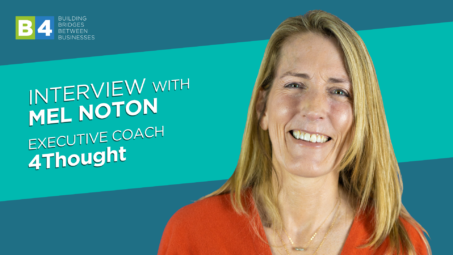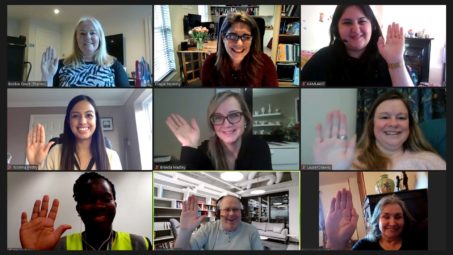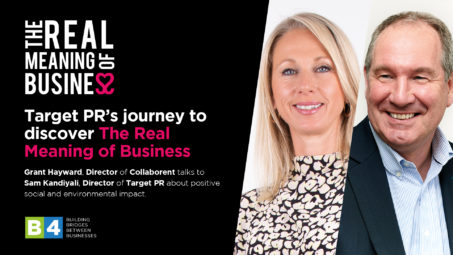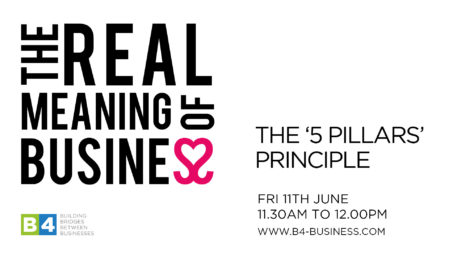
The significance of Social Enterprise
Social Enterprise UK, the national body supporting Social Enterprise, awarded Oxfordshire the accolade of becoming the first Social Enterprise “County” in recognition of the “hot bed” of social enterprise and social entrepreneurs we have locally.
But what are they, why are they important and why should and how can mainstream businesses like yours engage with them?
What is a Social Enterprise?
Social Enterprises take many forms but are essentially businesses like any other, trading to make a profit. The difference is that they exist to tackle social and/or environmental challenges and most if not all of the profits they make are ploughed back into the business to help support their work.
There are over 100,000 social enterprises contributing £60bn to UK GDP, so it’s a significant and important part of the economy. These organisations can be charities, include cooperatives, but can also be certain forms of private limited companies too.
Why are Social Enterprises important to mainstream businesses?
Despite Oxfordshire enjoying one of the strongest economies in the UK, we still face many challenges that directly affect our businesses and trading environment. Social Enterprises are working hard to address many of these problems, for example, employment challenges, transport and even housing. To highlight and promote the opportunities for companies to engage and support this process, Social Enterprise UK introduced an initiative called the Buy Social Corporate Challenge.
Peter Holbrook, Chief Executive at SE UK said “the challenges we face in our communities, across our country and beyond, cannot be resolved by any one business or sector. The future we want to see, the one we must deliver will require the commitment and participation of all. The Buy Social Corporate Challenge helps business contribute to these challenges but can also provide a huge range of internal and external business benefits. It exemplifies why collaboration is key.” Look out in October for the SE UK campaign “Buy Social for a Better World”.
The introduction of The Social Value Act has also opened up more opportunities for businesses to engage. It obligates anyone spending public money to consider the Social Value that can be added over and above the contracts being delivered. Contractors are therefore being asked to demonstrate the Social Value they would add through the contracts they are bidding for. Companies who don’t directly provide services to the public sector may consider this doesn’t apply to them. However, those who do are asking their suppliers in turn to demonstrate the Social Value they can add and trading with Social Enterprises is one way to do this.
Social Enterprise in Oxfordshire
One example of an Oxfordshire Social Enterprise increasingly trading with local companies is award winning Aspire, focused on employment. Not only does it support its trainees back into the workplace after overcoming significant personal challenges, but it also provides high quality services including grounds maintenance, property refurbishment and recruitment services to local companies. The profits from these activities are invested into its charitable aims of tackling homelessness, reducing reoffending and alleviating poverty. It is also now helping aspiring entrepreneurs who have experienced disadvantage to develop and launch their own enterprises, through a new Business Club.
Recognising this significance of Social Enterprise to the local economy, OxLEP has been supporting and promoting it for many years through various initiatives and business support programmes, driven by its Growth Hub. OxLEP recently secured over £300,000 of European funding to ramp this up over the next three years. This bid to deliver the “eScalate” SE support programme was won by OSEP, a Social Enterprise established solely to support other local Social Enterprises and social entrepreneurs. Juliet Cornford is one of the volunteer directors of OSEP and also Senior Social Enterprise Consultant at the British Council’s global Social Enterprise programme. She explained, “OSEP is delighted to be driving a new capacity building programme on behalf of OXLEP, providing a central meeting place for social enterprises and purpose driven business. Oxfordshire is home to a vibrant social sector and these kinds of businesses play an increasingly important role in the local economy.”
A great example of mainstream business taking this seriously was that Blenheim was very keen to support this bid by agreeing a vital interest free, unsecured loan to enable the cash flow of the programme.
Through key stakeholders such as OxLEP, OSEP and Oxford City Council, Oxfordshire is leading the way alongside other Social Enterprise “Places” across the UK in championing and supporting the significance Social Enterprise has to the UK economy.
Peter Holbrook, of Social Enterprise UK explained, “OSEP has been catalytic in advancing the ecology for social enterprises in Oxfordshire and is a model to inspire others; the breadth of the partnership and its ability to convene, champion and accelerate the growth of the sector has been exceptional.”
Social Enterprise – making Oxfordshire a more inclusive economy
A significant shift has been taking place to ensure this vibrant local economy is one that works for everyone – and Social Enterprise is at the heart of helping to achieve this. The recently published Local Industrial Strategy from OxLEP includes the formation of an Inclusive Growth Commission. This will be informed by a series of Inclusive Growth seminars running until the end of this year organised by the Oxford Strategic Partnership in collaboration with Oxford City Council.
The Council also recently appointed a Cooperatives Champion in Councillor Richard Howlett, who explained “Cooperatives are social enterprises with democracy built into their DNA. This is an exciting time for those of us looking to rebalance our economy towards meeting social needs rather than simply expanding private profits”. A great example of a Cooperative working on our challenging local housing issues is Transition By Design, based at Makespace.
So, what can you do?
The “Buy Social for a Better World” initiative is a great way to engage, as is joining the Buy Social Corporate Challenge. But a great first step is to simply seek out and include Social Enterprises in your supply chain. It is not only good for your business, but great for the local economy, society and environment too. To find out more please get in touch:
grant@collaborent.co.uk
More in Coaching

Interview with Mel Noton of 4Thought: Pushing Boundaries & Delving Deeper
Mel Noton is an Executive Coach who has a passion for extracting the full potential of her clients which include CEO’s, senior leaders, executives or leadership teams. Mel is a specialist in managing challenging, emotionally straining and draining work conflicts and situations to successful outcomes.

RoSPA and L’Oréal’s ‘Leading Safely’ programme gains huge momentum
RoSPA and L’Oréal’s Leading Safely for Women programme, part of their Safe@Work-Safe@Home partnership, which launched earlier this year has had a ‘phenomenal response’, according to Dr Karen McDonnell, RoSPA’s health and safety policy adviser.

Charge what you’re worth and get it
Join Alison Haill for the first episode of the Alison Haill podcast “Charge What You’re Worth And Get It”.
From this author

Target PR’s journey to discover The Real Meaning of Business
In this session Grant Hayward and Sam Kandiyali use the recently developed B4 TRMOB graphic as a tool to highlight the ways in which Target PR use the business for positive social and environmental impact.

The ‘5 Pillars’ Principle | The Real Meaning of Business
On this episode of The Real Meaning of Business we illustrate the ‘5 pillars’ principle and how this framework can help members understand the context of what they might already be doing, as well as the opportunities and benefits of evolving and improving their business models.

Re-Energise Your ‘Mojo’
Back in November, B4 member Jackie Jarvis asked other members how they energised their ‘Mojo’. Now, as we hopefully approach, fingers crossed, the permanent end of lockdown, we revisit this article with Tim Wraith of Sobell House giving us an injection of his ways to keep going. Many of us will feel battered and bruised from the personal and professional challenges we have endured over the last 12 to 14 months, so how does Tim keep going? We also revisit what our members said last year in Jackie’s article.

